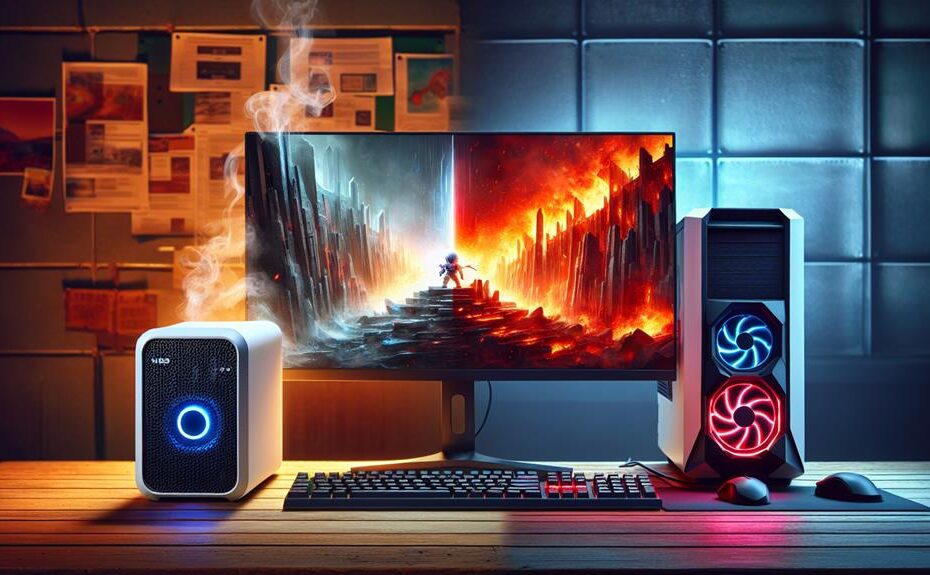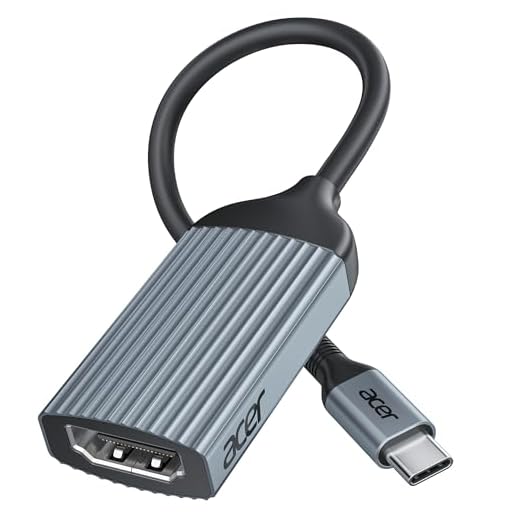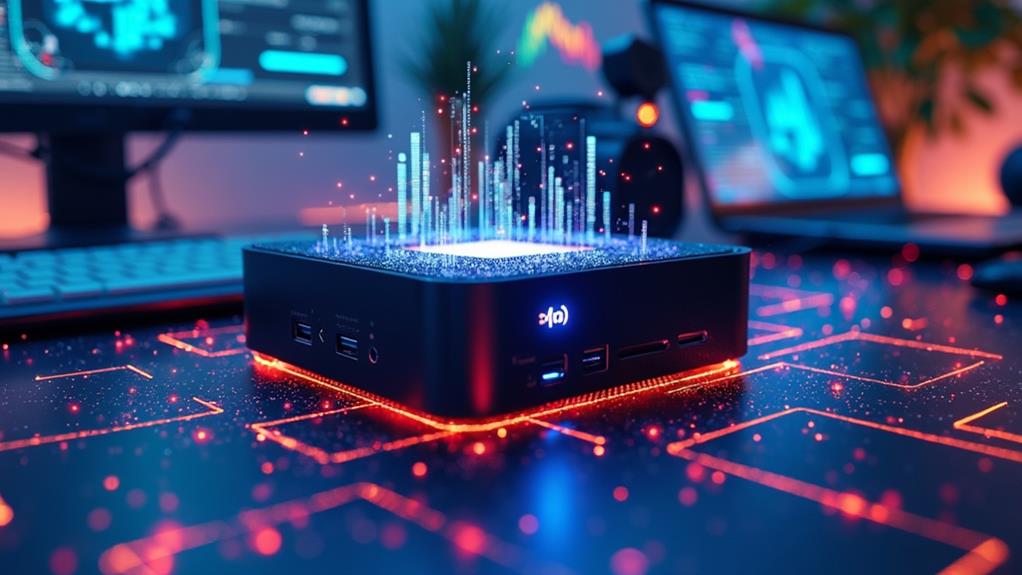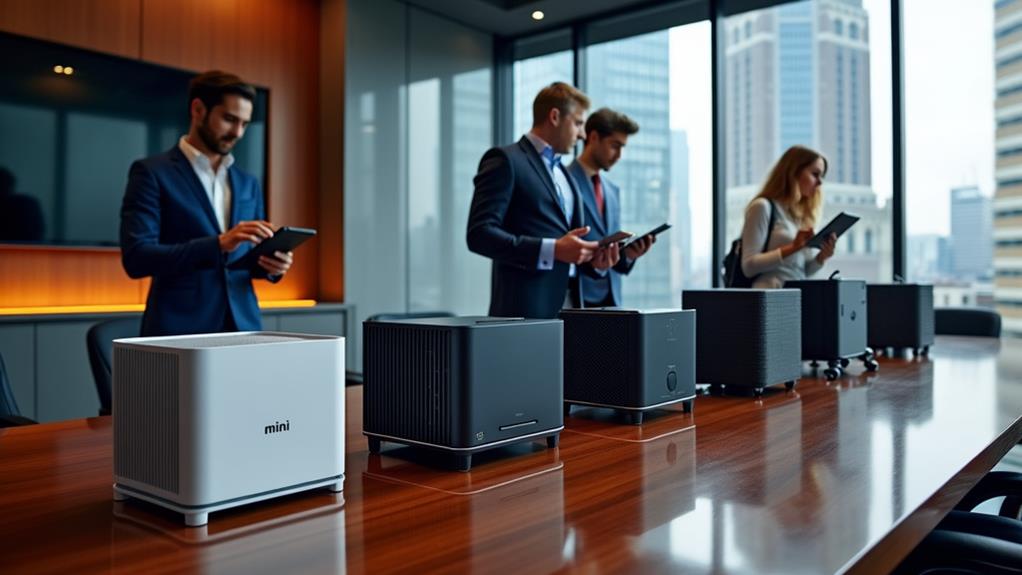



When gaming on a mini PC, you'll face limitations like restricted upgradability due to size constraints. Cooling might be a challenge as smaller PCs struggle with thermal issues. Processing power is limited compared to full-size desktops, affecting performance. Graphics cards are restricted by space and power supplies. Upgrading RAM can be complex due to space limitations. Storage space is often minimal, impacting game installation. Connectivity is limited, affecting peripheral use. Remember, delving deeper into these limitations will help you understand how to optimize your gaming setup.
Key Takeaways
- Limited upgradability due to compact size and compatibility issues.
- Cooling challenges from size constraints affect thermal management.
- Processing power limitations with lower-powered CPUs impact performance.
- Graphics card restrictions due to limited space and power supply.
- Storage space constraints require external solutions like cloud gaming or additional storage.
Limited Upgradability Options
Have you ever wondered why upgrading a mini PC for gaming can be quite challenging compared to a full-sized desktop? When it comes to limited upgradability options, mini PCs often face constraints due to their compact size. The upgrade compatibility of components in a mini PC is a significant issue. Unlike full-sized desktops, mini PCs may not support the latest graphics cards or other hardware due to space limitations and power constraints. This can result in performance trade-offs, where gamers have to settle for lower-performing components or face difficulties finding compatible upgrades.
Furthermore, the small form factor of mini PCs can limit the types of upgrades that can be performed. Upgrading components like the processor or graphics card may require specialized, smaller-sized parts that are not as readily available as those designed for full-sized desktops. This lack of flexibility in upgrading can restrict the overall performance potential of a mini PC for gaming, making it a less appealing option for those looking to continuously improve their gaming experience.
Size Constraints Affecting Cooling
Size constraints in mini PCs can greatly impact the effectiveness of cooling systems, leading to potential thermal issues during gaming sessions. Due to their compact size, mini PCs often have limited space for cooling components such as fans, heat sinks, and airflow channels. This limitation can result in reduced cooling efficiency and inadequate thermal management, especially when running demanding games that put a heavy load on the system.
Inadequate cooling can lead to overheating, causing the components to throttle performance to prevent damage. Thermal throttling can have a notable impact on gaming experience by reducing frame rates, causing lag, and affecting overall gameplay smoothness. Additionally, continuous exposure to high temperatures due to poor cooling can shorten the lifespan of the hardware components in a mini PC.
To mitigate these issues, users can consider external cooling solutions such as laptop cooling pads or external GPU enclosures with built-in cooling systems. Ensuring proper airflow within the limited space of a mini PC and regularly cleaning dust buildup can also help improve cooling efficiency and overall thermal management.
Processing Power Limitations
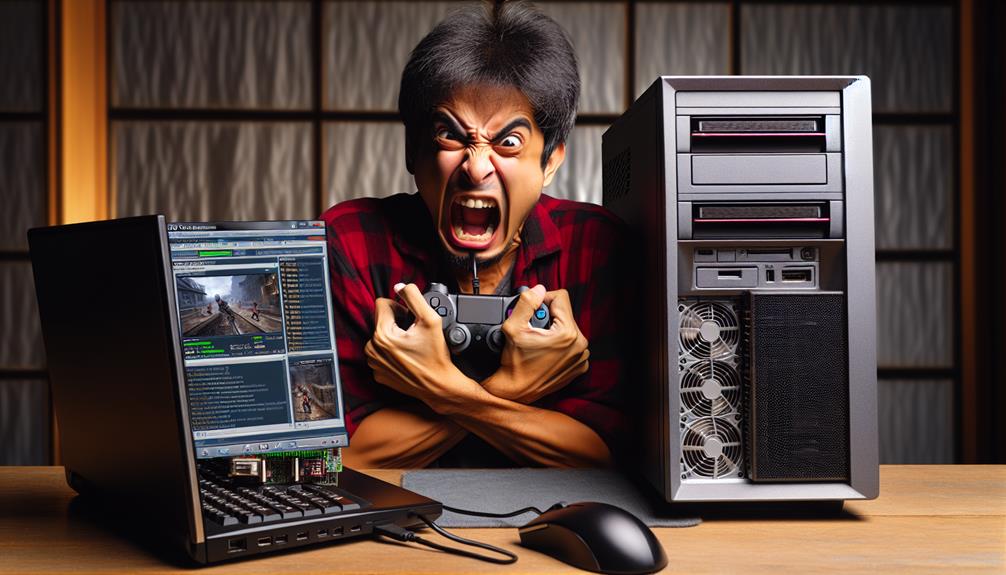
Limited processing power in mini PCs can hinder their ability to handle demanding gaming tasks effectively. Mini PCs usually come equipped with lower-powered CPUs compared to full-size desktop computers. This limitation can result in reduced performance when running resource-intensive games that require substantial processing capabilities. The constrained processing power may lead to lower frame rates, longer loading times, and overall diminished gaming experiences.
Furthermore, the limited processing power in mini PCs can impact power consumption. Higher processing demands can strain the system, causing it to draw more power, potentially leading to overheating issues or increased electricity usage. This can be a concern for gamers who value energy efficiency or who want to avoid overheating problems that could damage their system.
To overcome these processing power limitations, some users opt to connect an external GPU to their mini PC. This setup can offload the graphics processing tasks from the integrated GPU, thereby improving overall gaming performance without solely relying on the mini PC's internal processing capabilities. By utilizing an external GPU, gamers can enhance their gaming experience on a mini PC without being solely restricted by its processing limitations.
Graphics Card Restrictions
Given the compact nature of mini PCs, their design often presents restrictions when it comes to accommodating high-performance graphics cards. Mini PCs typically have limited space inside their cases, making it challenging to fit large, powerful graphics cards. This limitation is further compounded by the power supply constraints of mini PCs, which may not have the capacity to support high-end GPUs that require more power.
To overcome these graphics card restrictions, some users opt for external GPUs. External GPUs connect to the mini PC through a port like Thunderbolt 3, providing a way to harness the power of a dedicated graphics card without being limited by the internal space or power supply of the mini PC. While external GPUs offer a solution to the graphics card limitations of mini PCs, they can be costly and may not always provide the same level of performance as an internal GPU due to data transfer limitations.
RAM Upgrade Challenges
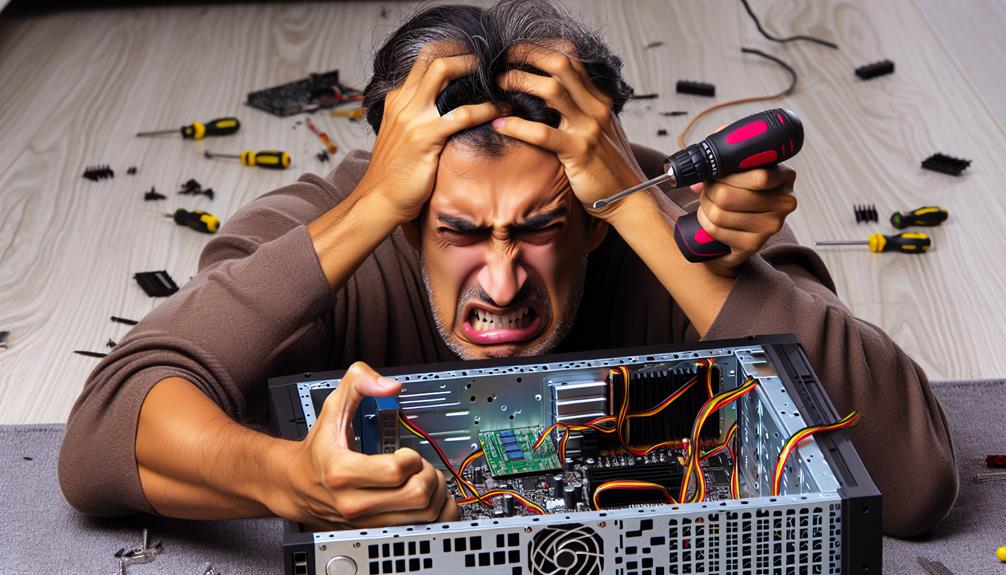
The constraints posed by the compact design of mini PCs extend beyond graphics card limitations, as users may encounter challenges when attempting to upgrade the RAM in these systems. One of the primary challenges users face is the limited space for additional RAM modules. Mini PCs are often designed with space-saving in mind, which can make it difficult to access and add more RAM. This limitation can be frustrating, especially for gamers looking to boost their system's performance.
Compatibility issues also present a significant challenge when upgrading RAM in mini PCs. Due to the compact nature of these systems, they may have specific requirements for RAM modules, such as size and speed. Finding RAM that fits these criteria can be tricky, and not all RAM sticks may be compatible with a particular mini PC model. This can lead to users having to spend extra time researching and ensuring they purchase the right RAM for their system, adding another layer of complexity to the upgrade process.
Storage Space Constraints
Traversing through the intricacies of upgrading storage space in mini PCs requires a vital understanding of the system's limitations and compatibility requirements. Mini PCs often come with limited internal storage capacity, which can be a significant constraint for gamers looking to install multiple large games or store extensive multimedia libraries. In such cases, external storage solutions can be a viable option to expand storage space. External hard drives or solid-state drives can provide additional room for game installations and file storage, although they may not offer the same speed as internal drives.
Moreover, cloud gaming options are becoming increasingly popular among gamers with mini PCs facing storage constraints. Services like Google Stadia, NVIDIA GeForce Now, or Microsoft xCloud allow users to stream games over the internet without the need for extensive local storage. While these services can alleviate storage limitations, a stable and fast internet connection is vital for a smooth gaming experience. Considering a combination of external storage solutions and cloud gaming options can help mini PC gamers overcome storage space constraints effectively.
Ports and Connectivity Limitations
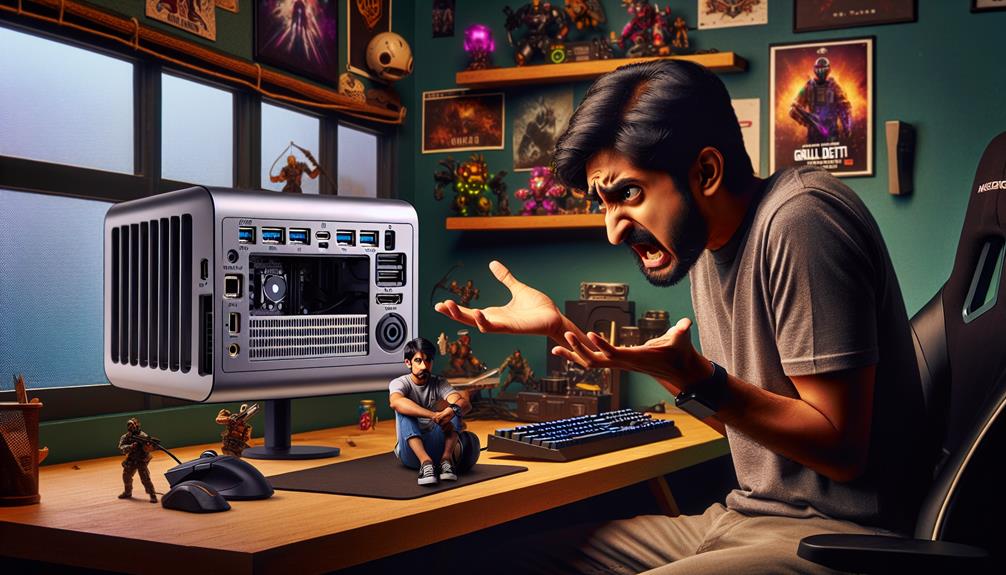
Exploring the intricacies of connectivity on mini PCs can reveal limitations in the number and types of ports available for expanding functionality. Mini PCs often come with a limited number of ports compared to standard desktops, which can impact your gaming experience. The availability of ports such as USB, HDMI, DisplayPort, Ethernet, and audio jacks may be restricted on mini PCs, potentially affecting your ability to connect multiple peripherals simultaneously.
The absence of certain ports can lead to performance impact, as you may not be able to utilize specific devices or accessories essential for gaming. Additionally, the limited ports can result in challenges with cable management. With fewer ports to connect devices like controllers, external storage, or VR headsets, you may face difficulties organizing and securing cables around your mini PC setup.
To overcome these connectivity limitations, you might need to invest in additional adapters or hubs, which can add to the overall cost and complexity of your gaming setup. Considering your specific gaming requirements and the types of peripherals you use is essential when dealing with the port constraints of a mini PC.
Overheating and Thermal Issues
Exploring the realm of mini PC gaming reveals an important aspect that requires attention: overheating and thermal issues. When pushing the boundaries of performance in a compact space, mini PCs can struggle to dissipate heat effectively. This can lead to performance impact as the components throttle to prevent damage from excessive temperatures. The confined space within a mini PC chassis restricts airflow, making it challenging for heat to escape efficiently.
To combat overheating, proper cooling solutions are essential. Mini PCs often come equipped with smaller fans or heatsinks compared to their larger counterparts. This can result in higher temperatures during intense gaming sessions. Users may need to contemplate additional cooling methods such as liquid cooling systems or external cooling pads to help regulate temperatures and maintain the best performance.
Compatibility With High-End Peripherals
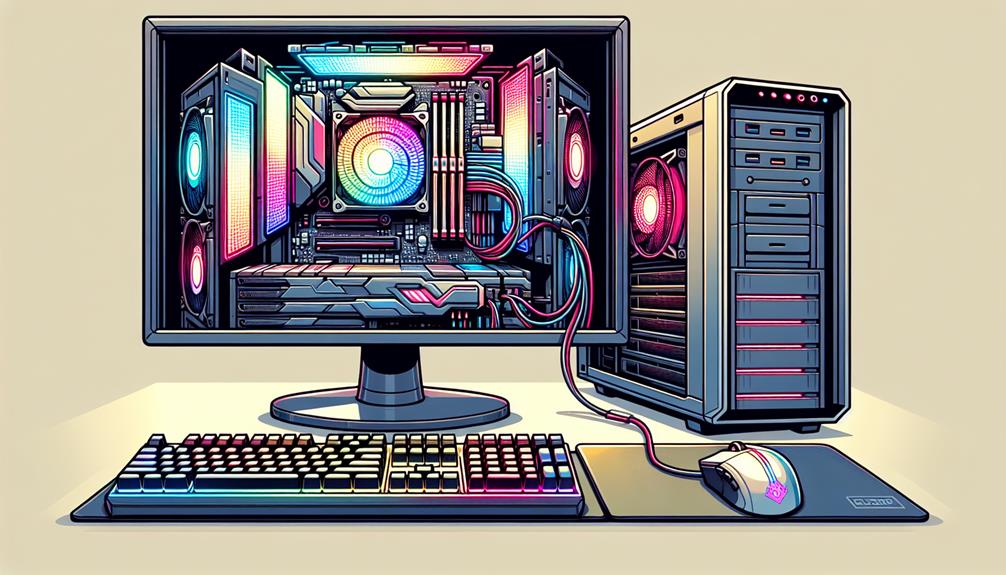
High-end peripherals may pose compatibility challenges when used with a mini PC due to limitations in connectivity and power supply. Mini PCs often come with a limited number of USB ports, which can be insufficient to connect multiple high-end peripherals such as gaming keyboards, mice, and controllers simultaneously. This can impact the overall gaming experience by causing delays or interruptions in inputs due to overcrowded ports.
Moreover, high-end peripherals like mechanical keyboards, high-DPI mice, or specialized gaming controllers may require more power than a mini PC can effectively provide. This could result in intermittent connectivity issues or reduced functionality of these peripherals, affecting the overall gaming performance.
To address these challenges, users can invest in USB hubs or powered USB ports to expand connectivity options and guarantee a stable power supply to high-end peripherals. Additionally, checking the power requirements of peripherals before purchasing them can help prevent compatibility issues and optimize the gaming experience on a mini PC.
Future-Proofing Concerns
When contemplating the limitations of a mini PC for gaming, future-proofing concerns emerge as an essential aspect to assess for long-term gaming performance. The issue of hardware compatibility is vital when it comes to ensuring that your mini PC can support upcoming game releases and updates. As technology advances rapidly in the gaming industry, newer games often demand more powerful hardware components. Mini PCs, due to their compact size, may have limited upgrade options compared to larger desktops, making it challenging to keep up with the increasing system requirements of modern games.
Furthermore, performance sustainability is another key factor to assess in future-proofing a mini PC for gaming. While a mini PC may offer satisfactory performance for current games, it may struggle to run future titles smoothly as game developers continuously push the boundaries of graphics and gameplay. Upgrading components in a mini PC can be more complex and limited compared to traditional desktops, potentially leading to a shorter lifespan for your gaming setup. To address future-proofing concerns, carefully research and invest in a mini PC with upgradeable components and sufficient power to handle upcoming gaming advancements.
Disclosure: As an Amazon Associate, I earn from qualifying purchases.
